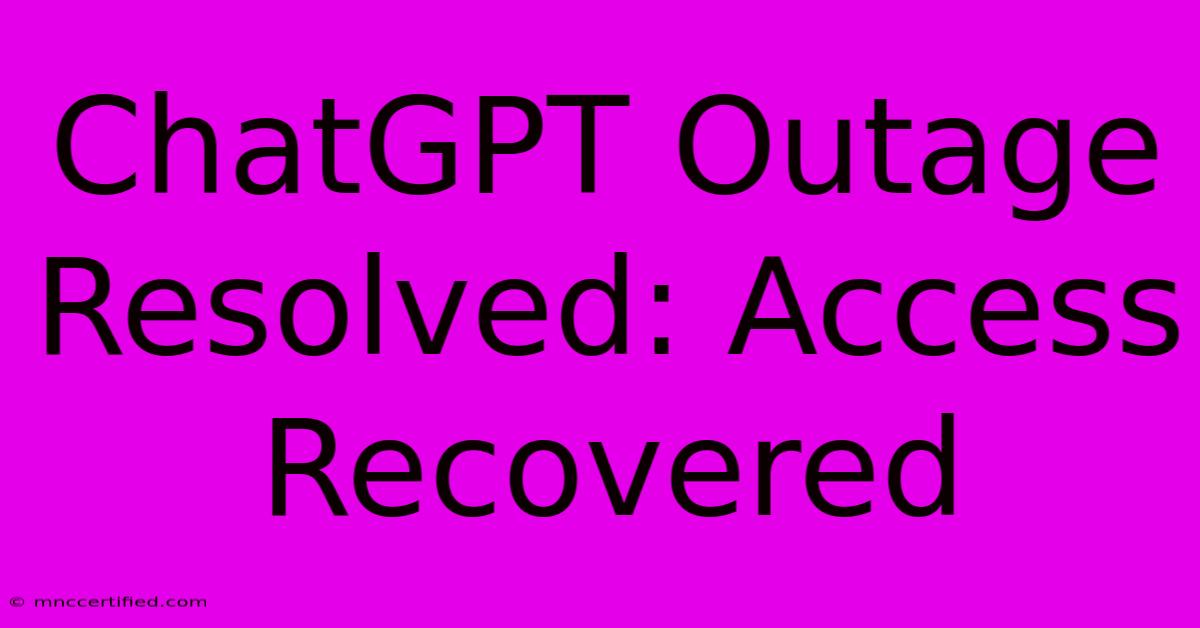ChatGPT Outage Resolved: Access Recovered

Table of Contents
ChatGPT Outage Resolved: Access Recovered
ChatGPT users rejoice! After a period of frustrating downtime, access to the popular AI chatbot has been fully restored. This article covers the outage, its potential causes, and what you can do to avoid similar disruptions in the future.
What Happened During the ChatGPT Outage?
On [Insert Date of Outage Here], many users reported experiencing difficulties accessing ChatGPT. The outage wasn't just a minor glitch; widespread reports flooded social media, highlighting the significant impact on users relying on the platform for various tasks, from writing and coding to creative brainstorming. The official ChatGPT channels [mention official channels like Twitter, etc.] remained relatively silent during the initial stages, fueling speculation and anxiety among its large user base. The exact nature of the problem remained undisclosed initially, leaving users in the dark about the expected resolution time.
Potential Causes of the ChatGPT Outage:
While OpenAI hasn't publicly confirmed the specific cause, several factors could have contributed to the outage:
- Increased Server Load: ChatGPT's immense popularity often leads to periods of high server demand. A sudden surge in users, perhaps due to a trending topic or news event, could have overwhelmed the system's capacity.
- Software Bugs/Glitches: Software errors are unavoidable in complex applications. A critical bug could have caused widespread service disruption, requiring immediate attention from OpenAI's engineering team.
- Network Infrastructure Issues: Problems with OpenAI's underlying network infrastructure, such as power outages or connectivity problems, could also have contributed to the outage.
- Maintenance and Updates: While less likely to cause a complete outage, scheduled maintenance or software updates could have temporarily disrupted service if not managed correctly.
What to Do During Future ChatGPT Outages:
While OpenAI strives for maximum uptime, future outages are always a possibility. Here's how to prepare:
- Check OpenAI's Status Pages: OpenAI and similar services often maintain status pages that provide updates on service disruptions. Bookmark these pages for quick access during potential issues.
- Monitor Social Media: Platforms like Twitter can provide real-time information from other users and (potentially) official announcements from OpenAI. Following relevant accounts can help keep you informed.
- Utilize Alternative AI Chatbots: Explore other AI chatbots as backup options. While no perfect replacement exists, several alternatives offer similar functionality, allowing for some continuity during outages.
- Practice Patience: During large-scale outages, patience is key. The OpenAI team likely works diligently to resolve the problem as quickly as possible.
Conclusion: Lessons Learned From the ChatGPT Outage
The recent ChatGPT outage served as a reminder of the dependence many have on AI-powered tools. While frustrating, it also highlighted the importance of robust infrastructure, proactive monitoring, and transparent communication from service providers. OpenAI's swift resolution of the outage suggests a commitment to minimizing future disruptions. However, users should proactively prepare for potential future interruptions by following the tips outlined above. The seamless return to service demonstrates the value and resilience of the platform, reassuring its vast user base.

Thank you for visiting our website wich cover about ChatGPT Outage Resolved: Access Recovered. We hope the information provided has been useful to you. Feel free to contact us if you have any questions or need further assistance. See you next time and dont miss to bookmark.
Featured Posts
-
Norwegian Cruise Line Overboard
Dec 28, 2024
-
Navy Vs Oklahoma Horvaths Impact
Dec 28, 2024
-
Tigers Infield Bolstered By Torres
Dec 28, 2024
-
Fabianski Conscious After Injury
Dec 28, 2024
-
Vanderbilt Qb Pavias Ball Toss
Dec 28, 2024